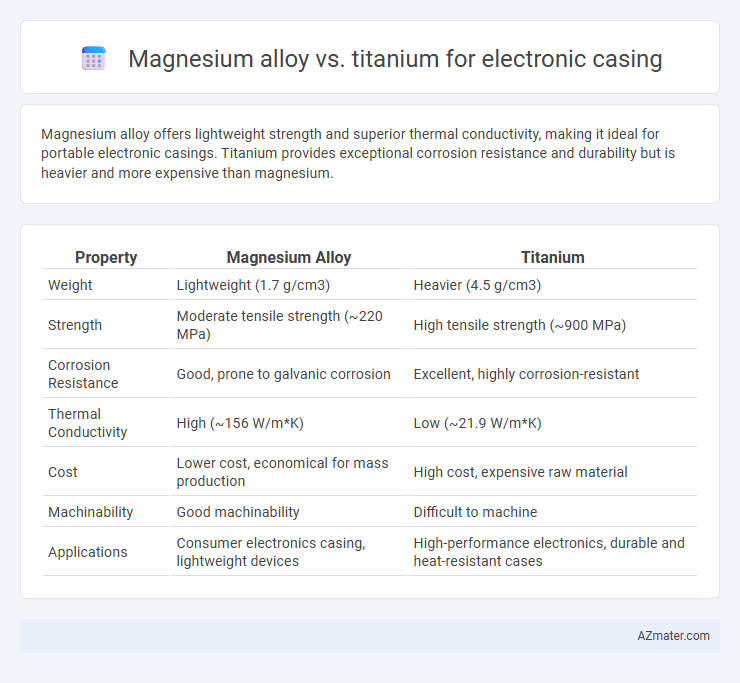Magnesium alloy offers lightweight strength and superior thermal conductivity, making it ideal for portable electronic casings. Titanium provides exceptional corrosion resistance and durability but is heavier and more expensive than magnesium.
Table of Comparison
| Property | Magnesium Alloy | Titanium |
|---|---|---|
| Weight | Lightweight (1.7 g/cm3) | Heavier (4.5 g/cm3) |
| Strength | Moderate tensile strength (~220 MPa) | High tensile strength (~900 MPa) |
| Corrosion Resistance | Good, prone to galvanic corrosion | Excellent, highly corrosion-resistant |
| Thermal Conductivity | High (~156 W/m*K) | Low (~21.9 W/m*K) |
| Cost | Lower cost, economical for mass production | High cost, expensive raw material |
| Machinability | Good machinability | Difficult to machine |
| Applications | Consumer electronics casing, lightweight devices | High-performance electronics, durable and heat-resistant cases |
Introduction to Electronic Casing Materials
Magnesium alloy and titanium are prominent materials used in electronic casing due to their distinct properties. Magnesium alloy offers lightweight construction with excellent electromagnetic interference (EMI) shielding, making it ideal for portable devices. Titanium provides superior strength, corrosion resistance, and biocompatibility, often preferred for high-end electronics requiring enhanced durability and premium finish.
Overview of Magnesium Alloy and Titanium
Magnesium alloy offers a lightweight solution with excellent electromagnetic interference (EMI) shielding, corrosion resistance, and good thermal conductivity, making it ideal for electronic casings requiring weight reduction and heat dissipation. Titanium provides superior strength, corrosion resistance, and biocompatibility, with enhanced durability in harsh environments, though it is heavier and more expensive than magnesium alloys. Both materials balance protection and performance, but magnesium alloys excel in lightweight applications, whereas titanium is preferred for rugged, long-lasting electronic housings.
Mechanical Strength Comparison
Magnesium alloy typically offers lower mechanical strength compared to titanium, with tensile strengths ranging between 200-350 MPa, whereas titanium alloys provide tensile strengths up to 900 MPa, making titanium more suitable for highly durable electronic casings. Despite being lighter, magnesium alloys present lower fatigue resistance and yield strength, which can limit their use in applications requiring robust mechanical performance. Titanium's superior strength-to-weight ratio and excellent resistance to deformation under stress make it the preferred choice for high-end, mechanically demanding electronic housing solutions.
Weight and Density Analysis
Magnesium alloy offers a significant advantage in weight reduction for electronic casing, with a density of approximately 1.74 g/cm3, which is about two-thirds lighter than titanium's 4.51 g/cm3 density. This substantial difference in density means magnesium alloy casings provide lighter electronic devices, enhancing portability without compromising structural integrity. Titanium, while heavier, delivers superior strength-to-weight ratio and corrosion resistance but at the cost of increased weight compared to magnesium alloys.
Thermal Conductivity and Heat Dissipation
Magnesium alloy exhibits a thermal conductivity of approximately 156 W/m*K, significantly higher than titanium's 7 W/m*K, making it more efficient for electronic casing heat dissipation. This superior thermal performance enables magnesium alloy to rapidly transfer and spread heat away from sensitive components, reducing the risk of overheating. Titanium, while offering excellent strength and corrosion resistance, is less effective in managing thermal loads due to its lower thermal conductivity, often requiring additional cooling solutions in electronic enclosures.
Corrosion Resistance and Durability
Magnesium alloy offers excellent corrosion resistance when treated with proper coatings, making it suitable for lightweight electronic casings where weight reduction is critical. Titanium provides superior durability and an inherently high resistance to corrosion in harsh environments, ensuring long-term structural integrity for premium electronic enclosures. Both materials balance strength and protection, with titanium excelling in lifespan and magnesium alloys favored for cost-effective, lightweight solutions.
Machinability and Manufacturing Efficiency
Magnesium alloy offers superior machinability compared to titanium, allowing faster cutting speeds and reduced tool wear, which enhances manufacturing efficiency for electronic casing production. Titanium, though stronger and more corrosion-resistant, requires specialized tooling and slower machining processes, increasing production time and costs. Choosing magnesium alloy results in quicker turnaround and lower manufacturing expenses while maintaining adequate protection for electronic devices.
Cost Effectiveness and Material Availability
Magnesium alloy offers significant cost advantages over titanium due to lower raw material prices and easier manufacturing processes, making it a preferred choice for electronic casing production where budget constraints exist. The abundant availability of magnesium further reduces supply chain risks and lead times compared to titanium, which is scarcer and requires energy-intensive extraction. Despite titanium's superior strength and corrosion resistance, the economic benefits of magnesium alloys make them more practical for large-scale electronic casing applications.
Environmental Impact and Sustainability
Magnesium alloy, being more abundant and easier to recycle than titanium, offers a lower environmental footprint during extraction and processing for electronic casing. Titanium production involves higher energy consumption and generates more greenhouse gas emissions, impacting sustainability negatively despite its corrosion resistance and strength benefits. Magnesium alloys' biodegradability and reduced carbon footprint contribute to greener electronic casing solutions in comparison to titanium.
Conclusion: Choosing the Optimal Material
Magnesium alloy offers lightweight characteristics and excellent thermal conductivity, making it ideal for electronic casings requiring efficient heat dissipation and portability. Titanium provides superior strength, corrosion resistance, and durability, suitable for rugged environments and premium device protection. Selecting between magnesium alloy and titanium depends on balancing the need for lightweight design versus enhanced mechanical robustness and cost considerations.

Infographic: Magnesium alloy vs Titanium for Electronic casing
 azmater.com
azmater.com